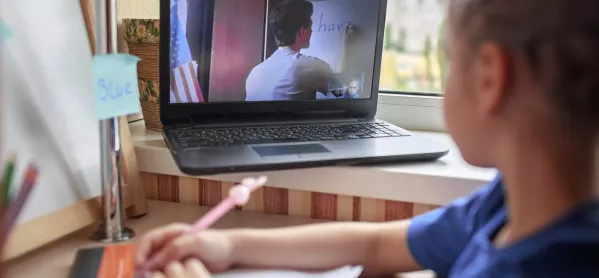
5 ways remote learning has changed English teaching

The pandemic has changed many aspects of teaching, with remote learning and lessons over Teams or Zoom becoming a fixture of the school day.
But how has it impacted a subject like English, where teachers and students rely on in-depth discussion of texts and ideas to make sense of the world around them?
Here are some of the concerns English teachers have about remote learning as well as some of the benefits they have noticed.
1. It does not lend itself to reading extended texts
One English teacher told Tes that uncertainty over what will appear in this year’s GCSE and A-level assessment tasks meant their school had junked literature study in favour of English language.
“We’re just doing language during our live lessons at the moment because pupils didn’t take their texts home over Christmas and, to be honest, I can’t even be sure now what literature content the exam board will actually require us to do. It very much feels like we’re treading water,” they said.
And English teacher Lynne Voyce said she was “a little concerned that remote learning doesn’t necessarily lend itself to reading extended texts”.
“Opening a Teams lesson and seeing acres of text can be off-putting for students and live lessons have to be particularly lively to keep students engaged. The only option is to ask students to read the text before the lesson - and that in itself means students have to be motivated to read.”
2. Extended writing is more difficult for students, too
There are also fears that online lessons could limit pupils’ abilities to write for extended periods of time, with some also raising concerns about the impact on pupils’ handwriting.
Jonathan Morgan, director of the National Association for the Teaching of English (Nate), says the body “is concerned with the impact remote learning is having on English teaching, particularly on those students who require targeted writing support”.
“There are limits to how extended writing - especially supported by negotiated draft advice - can be sustained under distant conditions,” he adds.
And deputy head of English Heidi Drake says she has noticed “a general downward turn in the legibility of their [pupils’] handwriting alongside a decrease in the amount that students seem able to comfortably produce in timed conditions”.
“The lack of formal exams seems to have had a negative impact on the importance they attach to the quality of written communication side of the work as well,” she added.
3. There is less discussion and debate
What drives English teachers is how their subject can strike at the heart of so many complex debates about humanity, but it can be hard to discuss Iago’s motivations, or masculinity and war, when faced with a lot of screens on mute.
“Due to the content-heavy structure of online lessons that are currently recommended and endorsed by the Department for Education, the vital skills of investigating, exploring alternative interpretations, and applying knowledge gained through discussion and debate are inevitably being neglected,” Mr Morgan says.
“English may be reduced to measurable content for exams but that is not the same as English for education.”
And Nate chair Peter Thomas also raised concerns over whether online English lessons would simply become about subject content, not discussion.
“Despite the splendid efforts of teachers so far, the risk is that online lessons, especially if required to fill large parts of the day, are tilted in favour of curriculum coverage, ie subject content,” he said.
4. Students do not engage as well - or may not be able to
A further issue is that of engagement of students. Contentious as they might have been, the “bells and whistles” lessons with teachers dressed as Miss Havisham minus the rotting cake, or a trenches soundtrack to evoke some of the fear and horror of WWI did allow staff and students to explore texts creatively.
English teacher Lauran Hampshire-Dell says that a lack of student interaction can lead to a loss of valuable questioning and modelling time for students, especially if they are on mute or have no camera.
Mr Morgan adds that the technological challenges faced by students at home may make it harder for them to engage with lessons.
“It is...difficult to gauge student engagement online, particularly as many young people face technological challenges and do not have the physical, and emotional space to think clearly and respond as they would in a classroom environment,” he says.
“Young people will inevitably use extra screen time socially, particularly at the moment when they cannot see friends face to face. To therefore expect them to spend five hours plus a day for home schooling will also affect their physical and emotional wellbeing.”
5. But the profession is adapting
Despite the difficulties, some have reported how teachers are rallying together to adapt to the new normal.
“To be honest, everyone is being really positive,” one English teacher said.
“I think, as a profession, we’re keen to show how versatile and adaptable we can be considering all the teacher bashing that’s going on in the press.”
You need a Tes subscription to read this article
Subscribe now to read this article and get other subscriber-only content:
- Unlimited access to all Tes magazine content
- Exclusive subscriber-only stories
- Award-winning email newsletters
- Unlimited access to all Tes magazine content
- Exclusive subscriber-only stories
- Award-winning email newsletters
You need a subscription to read this article
Subscribe now to read this article and get other subscriber-only content, including:
- Unlimited access to all Tes magazine content
- Exclusive subscriber-only stories
- Award-winning email newsletters
- Unlimited access to all Tes magazine content
- Exclusive subscriber-only stories
- Award-winning email newsletters